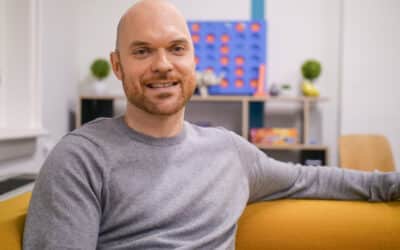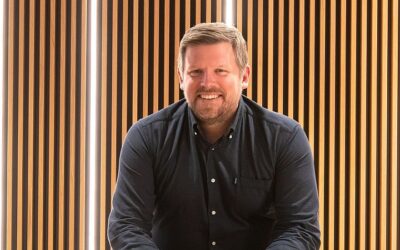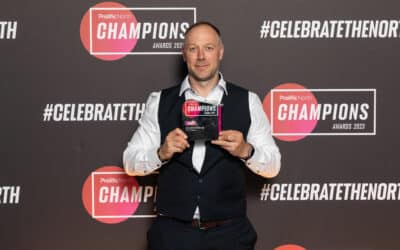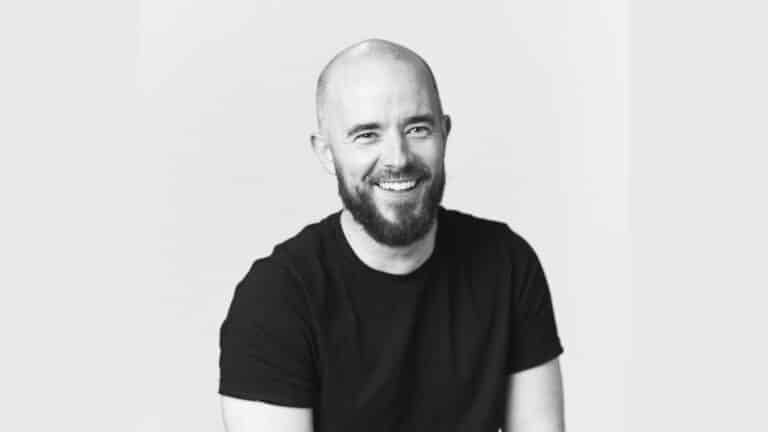Gary Toal is an award-winning copywriter, now the co-founder and creative director at Sergeant Walnuts.
From writing scripts for television, anthems for cities and books for billion-dollar brands like PlayStation, Dolmio and Umbro, to being involved in countless multi-channel campaigns, short-films, brand-conception and packaging projects – he’s done a bit of everything.
With previous roles as a creative director in Madrid and head of copy at LOVE in Manchester, he’s since worked with some big brand names after setting up on his own in 2020. These include Johnnie Walker, Nike, Canva, Nestle, Intel, Sky, NHS, Häagen Dazs, Penfolds, Under Armour and Adidas.
Alongside Richard Attwater he set up new creative agency Sergeant Walnuts last year in Manchester, after the duo formed a close friendship working in senior roles at LOVE.
Here, he shares all the lessons he’s learnt.
Which single daily habit or practice could you not do without?
Is this where I say journalling? I’ve read these interviews before. Everyone puts journalling, right?
I wish I could say I was an avid journaler but it’s not for me. I think it’s because I remember my grandma saying, “Never write something down you wouldn’t want to be read out in front of the entire school.” (I was seven at the time, but the fear of people hearing my inner-most thoughts is still very much alive. Unlike my grandma.)
Healthy habits are definitely important to me though, and I’m at my best when surrounded by routine. I was diagnosed with OCD at the ripe old age of 36. That means ‘winging it’ rarely works if I want to stay focused.
How I start my day is usually the deciding factor in its overall success. I try to wake up at the same time every morning, take the dog out, get sunlight in my eyes and, when I remember, breathe deeply. Back at my desk, I sip at a suitably strong coffee and check my inbox – crossing my fingers that today’s good emails outweigh the bad. (Luckily, they usually do.)
What’s been your luckiest break?
I’ve had a lot of good luck throughout my career. But I’ve also had plenty of bad. And since they’ve kind of cancelled each other out, does that mean I’ve had no luck at all? (I’m overthinking this aren’t I?)
Someone much cleverer than me once said, “Luck is the residue of design”. That means any luck (good or bad) is usually a consequence of the circumstances you create, wilfully or otherwise.
I’m well aware that I’m dangerously close to sounding like one of those guys who posts on LinkedIn posing next to a Porsche he rented by the hour just so he can use the caption ‘You Cayenne do anything you put your grind to’ – but that’s not my intention. I absolutely acknowledge that luck is a thing, but I believe we have more control over it than we think.
Looking back, I worked hard to be lucky and it paid off. I guess I was lucky to secure a copywriting placement at Brahm (Brass) in Leeds under the tutelage of Bill Lyne and Nelson McConnell. I was lucky to meet Darren Richardson and Dom Aldred at Gardiner Richardson who, to this day, keep me under their wing. I was lucky to be a Creative Director in Madrid and fall in love with a new city and a new language, and I was lucky that Dave Palmer hired me at LOVE despite having never met me.
In terms of my career, LOVE is probably the highlight. For the work I got to do, and the ridiculously talented people I got to work with. It set me up to do things I never thought possible, and for that I’ll always be grateful. Cheers, Dave!
What’s your best failure?
Surely this is about luck again? Luckily, I know another luck quote.
The Dalai Lama said, “Sometimes not getting what you want is a wonderful stroke of luck”. This happened to me very recently.
In 2020, I was supposed to move into a Creative Director role at a new agency, just as Covid was starting to make itself a household name. Unfortunately, the agency hit hard times, the job fell through, and I had to rethink things.
As it turned out, this was a massive blessing in disguise. It forced me to re-evaluate what I wanted and where I wanted to be. From there, I started my own company and it changed my life. The last two-and-a-bit years have brought me nothing but opportunity, and now, with our new agency in its infancy, the sky’s the limit. None of that would have happened without ‘failure’ as the catalyst.
What is the best investment you’ve ever made, either financial or time?
After leaving university, I worked within the community arts sector, creatively collaborating with people from all walks of life through varying developmental projects. This usually took the form of creative writing or performance theatre, and most of my time was spent going into schools or being part of projects organised by Youth Arts Groups and the Education Authority. However, I also worked with prisoners, drug addicts, people with disabilities and mental health challenges, ethnic minorities and troubled teenagers in a memorable array of diverse activities. It was incredibly rewarding, and my time spent working at HMS Northallerton may still be THE most rewarding time of my entire career, but it was a tough job for a young me. I couldn’t switch off, and struggled to shake off some of the things I’d seen or heard first-hand.
But I knew I wanted to write and, after a careers advisor told me about copywriting, I thought I’d give that a whirl. I mean, how hard can writing a few straplines be?! Just do it? Just did it, mate.
So, I wrote to a few agencies and asked if I could come in to get some experience. What eventually happened was that I worked full-time for six months for FREE. It was a costly experience, but a fantastic investment and, ultimately, it gave me a priceless education.
I didn’t enter the world of design and advertising via the same route as most of my peers, so I always felt like I was playing catch-up. But now, looking back, I believe that’s exactly what set me apart.
These days, I definitely don’t advocate agencies letting young people work for free for such a long period of time. But I do believe that if you’re just starting out in your career, investing a little more time and effort than you’re rewarded for will almost certainly pay back ten-fold in the long-run.
Which book would you recommend others to read and why?
That’s a toughie. I’ve always loved Jonathan Franzen’s writing, so I’ll give The Corrections top-billing here. (Freedom is excellent too.)
With recency bias firmly at play, my current non-fiction favourite is probably Lost Connections by Johan Hari. It’s a deep-dive into ‘depression’ and our general understanding of it. I devoured it recently whilst working remotely from Spain and I think it’s a valuable read for, well, anyone really. It opens your eyes to the constant bombardment of ‘things’ battling for your attention. There’s a reason we’re all exhausted and stressed and anxious, and much of the time it’s simply not our fault. That said, there are definitely flaws in some of his arguments, but that adds to the value in my eyes. It starts must-have conversations and leads to greater understanding, which can only be a good thing.
What one piece of advice would you give your 21-year-old self?
Where to start?! Don’t eat so many crisps. Be kind to strangers. Stop that, you’ll go blind.
My instinctive answer was to say, “Buy all the Bitcoins.” But then I’d have to explain cryptocurrency to my 21-year-old self and that wouldn’t end well for either for us because I’m still not entirely sure what it is.
Actually, there’s a William Shakespeare quote that I love, and it’s a concept I wish I’d embraced earlier in life – “There is nothing either good or bad, but thinking makes it so.” Is that advice? Probably not. My 21-year-old self wouldn’t listen anyway.
Who or what has had the single biggest influence on your working life?
When I was in my mid-twenties, my dad asked me if I thought I was still working-class. Such a loaded question led me to ask why he didn’t think I was working class. He said, and I quote, “You can’t be working-class. You went skiing and you like olives.”
I realised then and there that THE biggest influence on my career was my background. My family, my hometown, my best mates – who are still my best mates to this day. We all grew up with a lens of what life should or could be, and it was entirely shaped by circumstance and expectation. Only now, at 38, am I starting to fully appreciate that there really are no limitations on what you can be, where you can go, or whose lives you can impact. I wish someone would’ve told me that earlier.
I’m not saying I’ve achieved all I ever wanted, far from it, but if you’d have asked me growing up if I’d ever run my own company, or live in Spain (or go skiing and eat olives) I would’ve laughed. If there’s one thing that growing up has taught me, it’s that ANYTHING is possible.
Tell us something about you that would surprise people.
I once went on a live quiz show on Channel 5 called Brainteaser. I won. About a year later, someone recognised me in a pub and asked to have their picture taken with me. I tasted the celebrity life, and I’ve been dreaming of tasting it again ever since. Perhaps this article will get me back on the A-list.
What does success look like to you?
Work that doesn’t feel like work is priceless. And, most days, that’s how Sergeant Walnuts feels. I also get to work, and build something, with one of my best mates. For that, I’m very, very, very grateful.











